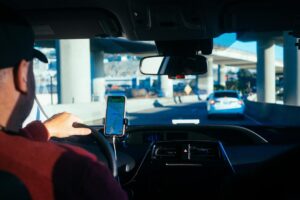
WHAT HAPPENS IF MY UBER DRIVER GETS IN AN ACCIDENT?
Common questions that we get are: What happens when these accidents occur? Who pays for damages? Can you sue Uber, or is it the driver’s own auto insurance coverage that matters?
The answer: it depends. Like so many other motor vehicle collisions, the aftermath of an Uber accident is rarely black and white; the different factors involved in the crash—who was at fault, whether the Uber driver had a passenger, the extent of the damages—all play a role in what happens next.
WAS THE DRIVER ACTIVELY DRIVING FOR UBER AT THE TIME OF THE CRASH?
Uber (and Lyft) offers insurance coverage for their drivers when their drivers are active, meaning they have the app turned on. When a driver does not have the app turned on, Uber doesn’t offer any coverage. If you were hit by an Uber driver who wasn’t actively looking for a ride or carrying a passenger, you can still file a claim, but you will need to file a typical car accident claim and seek compensation through the driver’s private auto insurance company or some other avenue.
However, if the driver did have the app turned on when the crash occurred, Uber covers bodily injury/death and property damage up to certain limits. These limits depend on the circumstances. If the Uber driver had the app turned on and was looking for a ride but hadn’t yet accepted one, Uber will provide up to $50,000 in bodily injury/death per person and up to $100,000 in bodily injury/death per accident, as well as up to $25,000 in property damage per accident. If the driver had accepted a ride and was on the way to pick up a passenger or was already carrying a passenger when the accident occurred, Uber offers up to $1 million in coverage.
So, for example, if you were hit by an Uber driver who had the app turned on but hadn’t accepted a ride, you are covered by the $50,000/$100,000/$25,000 coverage. If you are the passenger of an Uber that gets into an accident or were hit by an Uber driver who was on his way to pick up a passenger, you are covered by the $1 million.
It’s important to note that this coverage does not necessarily kick in automatically and, in fact, might only be applicable when the driver’s own liability insurance is not sufficient to cover the damages. However, because the driver was driving for pay at the time of the accident, his or her own insurance company may refuse to pay a claim. That’s when it becomes necessary to turn to Uber’s coverage.
WHAT TO DO AFTER THE ACCIDENT
- The first—and most important—thing to do after any accident, including one involving an Uber, Lyft, or other rideshare vehicle, is to assess your injuries and get immediate medical help if needed. If you believe you didn’t suffer any major injuries in the accident and it’s now been a few hours or days, make an appointment to see your doctor; you could have underlying injuries or injuries that will worsen over time without treatment. Your health and well-being are of the utmost importance.
- It’s also important that you report the accident to the police if you haven’t done so already. And, as soon as possible after the accident, document everything that happened and collecting any available evidence, including witness statements (if possible) and pictures of the accident scene and/or your injuries.
- After the accident, you may be contacted by Uber and asked to give a statement. You do not have to provide a statement to Uber, nor is it recommended that you do so. Instead, reach out to an experienced Uber accident attorney who can help you understand your legal options and protect your rights. Remember, anything you say to Uber in a statement could be potentially used later to deny your claim.
CAN UBER DENY ACCIDENT CLAIMS?
In short, yes—and they often do. Like any insurance company, Uber’s insurance provider is in the business of making money, and denying claims is one of the surest ways of cutting costs. Uber might deny your claim by arguing that its driver was not at fault for the accident or simply denying that they are liable. Because Uber doesn’t classify its drivers as “employees,” they can deny claims when a driver is distracted, drunk, or driving negligently.
If your claim is denied, you can file a lawsuit against Uber in order to seek damages. It is absolutely critical that you work with an attorney who is experienced in handling these types of cases, as the law is incredibly complex regarding Uber accidents and liability.
If you were involved in an accident with an Uber driver—whether as the passenger of the Uber, the occupant of another vehicle, a bicyclist, or a pedestrian—we encourage you to reach out to our attorneys at Omega Law Group, P.C. for a free and confidential consultation. We have extensive experience in this particular area of law and are well-versed in the legal intricacies involved. Our firm has recovered millions of dollars on behalf of our clients, and we are not afraid to take your case to court.
Contact us at 310-526-8383 to learn more about getting into an accident in an Uber.





